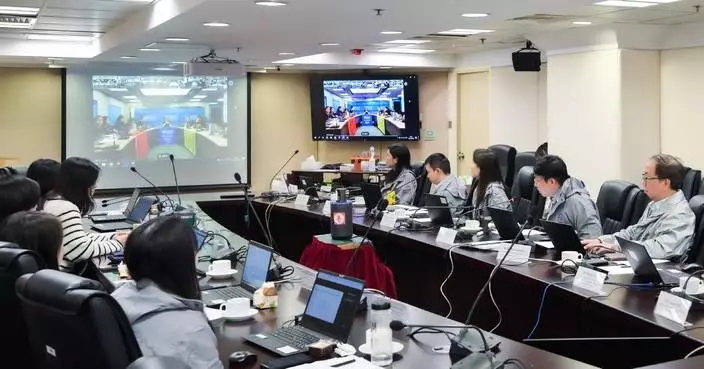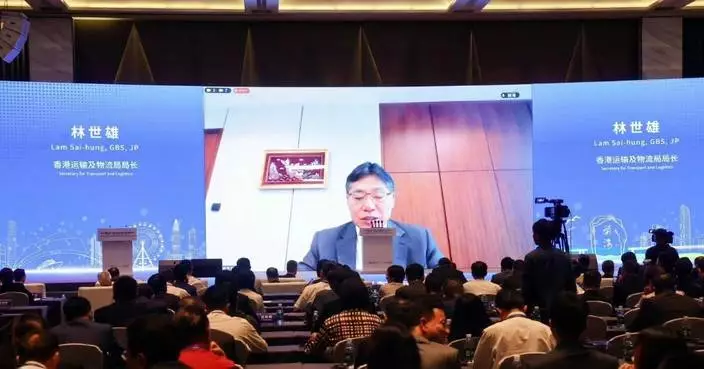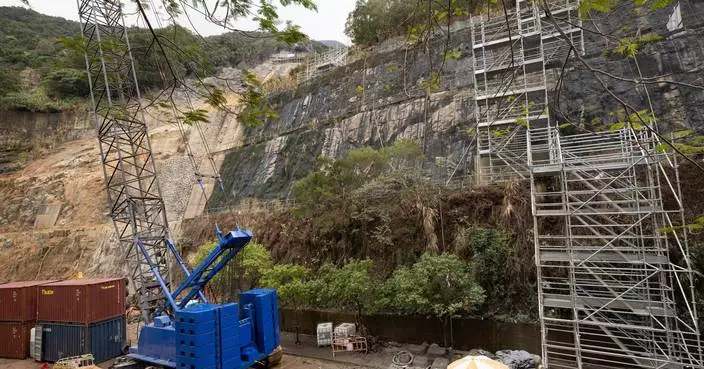Tender of one-year HONIA-indexed Floating Rate Notes to be held on November 20
The following is issued on behalf of the Hong Kong Monetary Authority:
The Hong Kong Monetary Authority (HKMA), as representative of the Hong Kong Special Administrative Region Government (HKSAR Government), announced today (November 14) that a tender of 1-year HONIA-indexed Floating Rate Notes (Notes) under the Infrastructure Bond Programme will be held on Wednesday, November 20, 2024, for settlement on Thursday, November 21, 2024.
A total of HK$1.5 billion 1-year HKD Notes will be tendered. The Notes will mature on November 21, 2025 and will carry interest indexed to the Hong Kong Dollar Overnight Index Average (HONIA), payable quarterly in arrear.
Tender is open only to Primary Dealers appointed under the Infrastructure Bond Programme. Anyone wishing to apply for the Notes on offer can do so through any of the Primary Dealers on the latest published list, which can be obtained from the Hong Kong Government Bonds website at www.hkgb.gov.hk. Each tender must be for an amount of HK$50,000 or integral multiples there of.
Tender results will be published on the HKMA's website, the Hong Kong Government Bonds website, Bloomberg (GBHK <GO>) and Refinitiv (IBPGSBPINDEX). The publication time is expected to be no later than 3pm on the tender day.
HKSAR Institutional GovernmentBonds tender information
-----------------------------------------------------------------------------------------
Tender information of 1-year HONIA-indexed Floating Rate Notes:
Issue Number |
: |
01GH2511001 |
Stock Code |
: |
4285 (HKGB FRN 2511) |
Tender Date and Time |
: |
Wednesday, November 20, 2024
9:30 am to 10:30 am |
Issue and Settlement Date |
: |
Thursday, November 21, 2024 |
Amount on Offer |
: |
HK$1.5 billion |
Issue Price |
: |
At par |
Maturity |
: |
1 year |
Maturity Date |
: |
Friday, November 21, 2025 |
Interest Rate |
: |
Indexed to the sum of the annualised compounded average of daily HONIA in each interest period and the highest accepted spread at tender, subject to a minimum of 0 per cent per interest period. Details on calculation of interest rate are available at the Institutional Issuances Tender Information Memorandum of the Infrastructure Bond Programme and Government Sustainable Bond Programme (Information Memorandum) published on the Hong Kong Government Bonds website. |
Interest Period End Dates |
: |
February 21, 2025
May 21, 2025
August 21, 2025
November 21, 2025 |
Interest Payment Dates |
: |
February 25, 2025
May 23, 2025
August 25, 2025
November 25, 2025 |
Method of Tender |
: |
Competitive tender |
Tender Amount |
: |
Each competitive tender must be for an amount of HK$50,000 or integral multiples thereof. Any tender applications for the Notes must be submitted through a Primary Dealer on the latest published list. |
Other Details |
: |
Please see the Information Memorandum available on the Hong Kong Government Bonds websiteor approach Primary Dealers. |
Expected commencement date of dealing on
the Stock Exchange
of Hong Kong Limited |
: |
Friday, November 22, 2024 |
Use of Proceeds |
: |
The Notes will be issued under the institutional part of the Infrastructure Bond Programme. Proceeds will be invested in infrastructure projects in accordance with the Infrastructure Bond Framework published on the Hong Kong Government Bonds website. |
Government publishes report on latest manpower projection
The Labour and Welfare Bureau (LWB) today (November 14) published the report on the 2023 Manpower Projection. The projection indicates that Hong Kong is expected to face a manpower shortage of 180 000 by 2028.
The Government has been conducting periodic manpower projection (MP) exercises to assess Hong Kong's future manpower supply and requirement trends at a macro level. With 2023 as the base year, the latest round of MP projects the manpower situation five years ahead (i.e. 2028). In addition to overall manpower trends, the report provides a detailed analysis of the manpower situation in 17 selected industries, as well as occupations in demand and essential skills. The 17 selected industries include the eight key areas for the development of Hong Kong as outlined in the National 14th Five-Year Plan (the "eight centres") (Note 1) and nine significant sectors supporting local services and city operations (Note 2). Together, these industries cover over 2.8 million workers or 80 per cent of Hong Kong's workforce and contribute more than 70 per cent of the city's Gross Domestic Product.
In 2023, Hong Kong's economy gradually recovered from the pandemic which led to an increase in manpower demand. However, the local labour force (excluding foreign domestic helpers) had decreased for three consecutive years during the pandemic to 3.5 million, causing a tight labour market with a shortage of approximately 50 000 workers. Most of the selected industries experienced manpower shortages of varying degrees, with more notable gaps observed in some labour-intensive sectors such as construction, city operations, health services, accommodation and food, retail, tourism, as well as in the innovation and technology industry that the Government is actively promoting. Each of these sectors reported a shortage of over 5 000 workers. The manpower situation across selected industries in 2023 is at Annex I.
Hong Kong's economy is projected to grow by 3.2 per cent annually during the projection period, driving sustained high demand for manpower from major industries. By 2028, the local labour force is projected to slightly increase to 3.56 million. The supply of local manpower would nevertheless fall short to meet the rising demand, resulting in a widening manpower shortage of 180 000, an increase of 130 000 from 2023. Due to an ageing workforce and a lack of new entrants, the projection indicates that there would be a severe shortage of "skilled technical workers", accounting for over one-third of the total shortage in 2028. All selected industries are projected to face manpower shortages of varying degrees. The respective shortage of 10 industries would exceed 10 000 workers. The projected manpower situation for the selected industries in 2028 is at Annex II.
Looking ahead, economic restructuring, technology advancement, business automation and digitalisation across industries would alter demand for job roles and skills in the market. Even conventional industries like the legal services and accountancy are embracing digital transformation. Some traditional positions (such as clerical and administrative roles performing routine and mundane tasks) may gradually be replaced by automation. Meanwhile, there would be rising demand for new roles related to digitalised operations (such as artificial intelligence (AI) specialists, data analysts and information technology experts). Therefore, the labour force on the one hand should need to master core skills being sought in the market (such as language proficiency, communication skills, teamwork and problem-solving abilities), but also need to acquire new operational skills (such as e-commerce and AI applications) in response to industry transformations and changes in operational models on an ongoing basis to remain competitive.
The Secretary for Labour and Welfare, Mr Chris Sun, stated, "According to the latest MP findings, there would be severe manpower shortages in Hong Kong in the next five years. The Government and all quarters of the community should collaborate to address this challenge and consider how to put our precious workforce to good use, enhance the quality and quantity of local manpower and increase overall productivity with a view to promoting the high-quality development of Hong Kong. The Government would enhance and expand local training to preserve the competitiveness of the local workforce amidst the rapidly changing market. In facing the challenge of manpower shortages, Hong Kong would continue to import outside talent and labour at an appropriate scale to meet imminent needs."
The 2023 Manpower Projection report has been uploaded to the website of the LWB (www.lwb.gov.hk/en/highlights/manpower_projection/index.html).
Note 1: "eight centres" are an East-meets-West centre for international cultural exchange, an international aviation hub, an international financial centre, an international innovation and technology centre, an international trade centre, an international transportation centre, a regional centre for international legal and dispute resolution services as well as a regional intellectual property trading centre.
Note 2: nine significant sectors are accommodation and food services, city operation, construction industry, education, health services, manufacturing, retail, social services and tourism.







